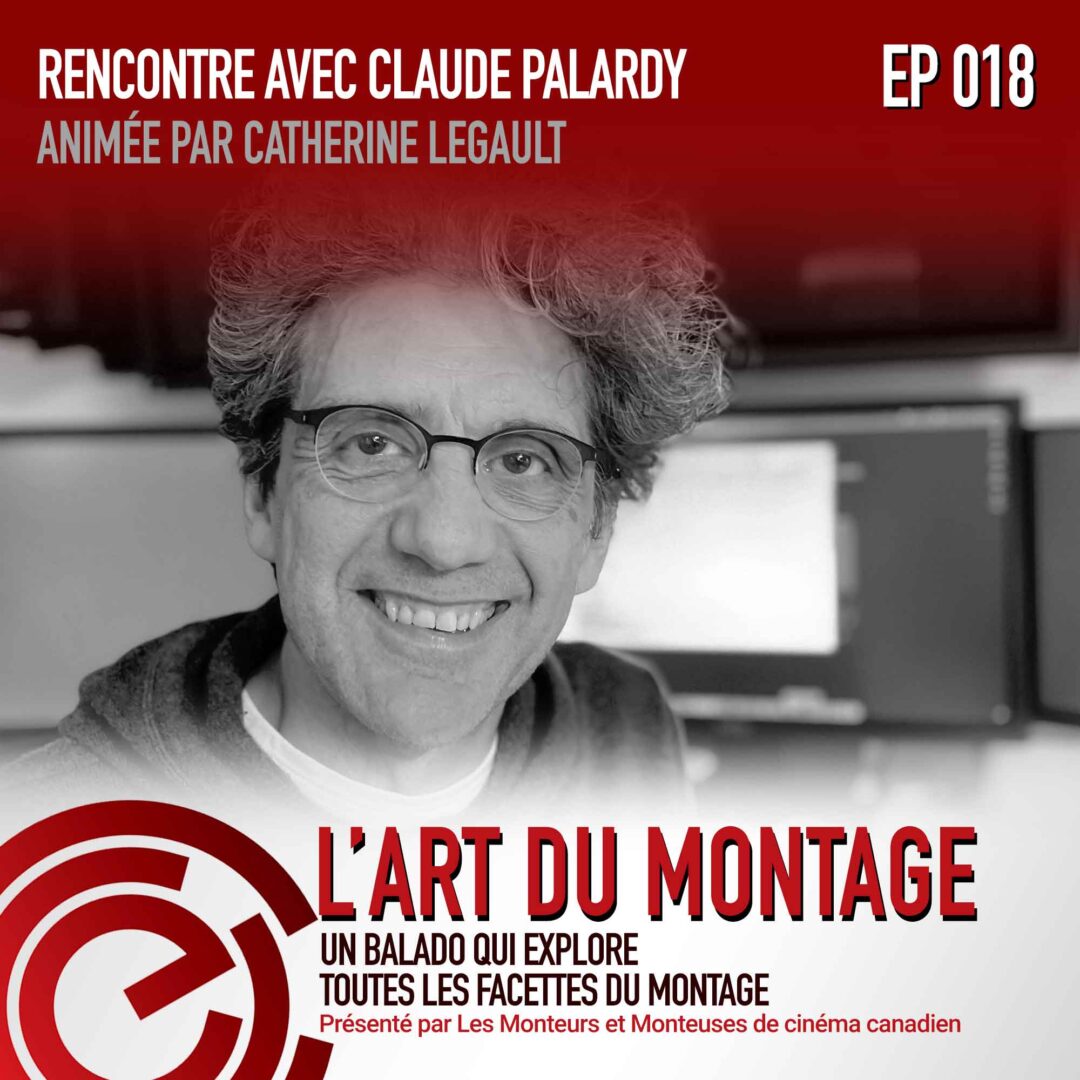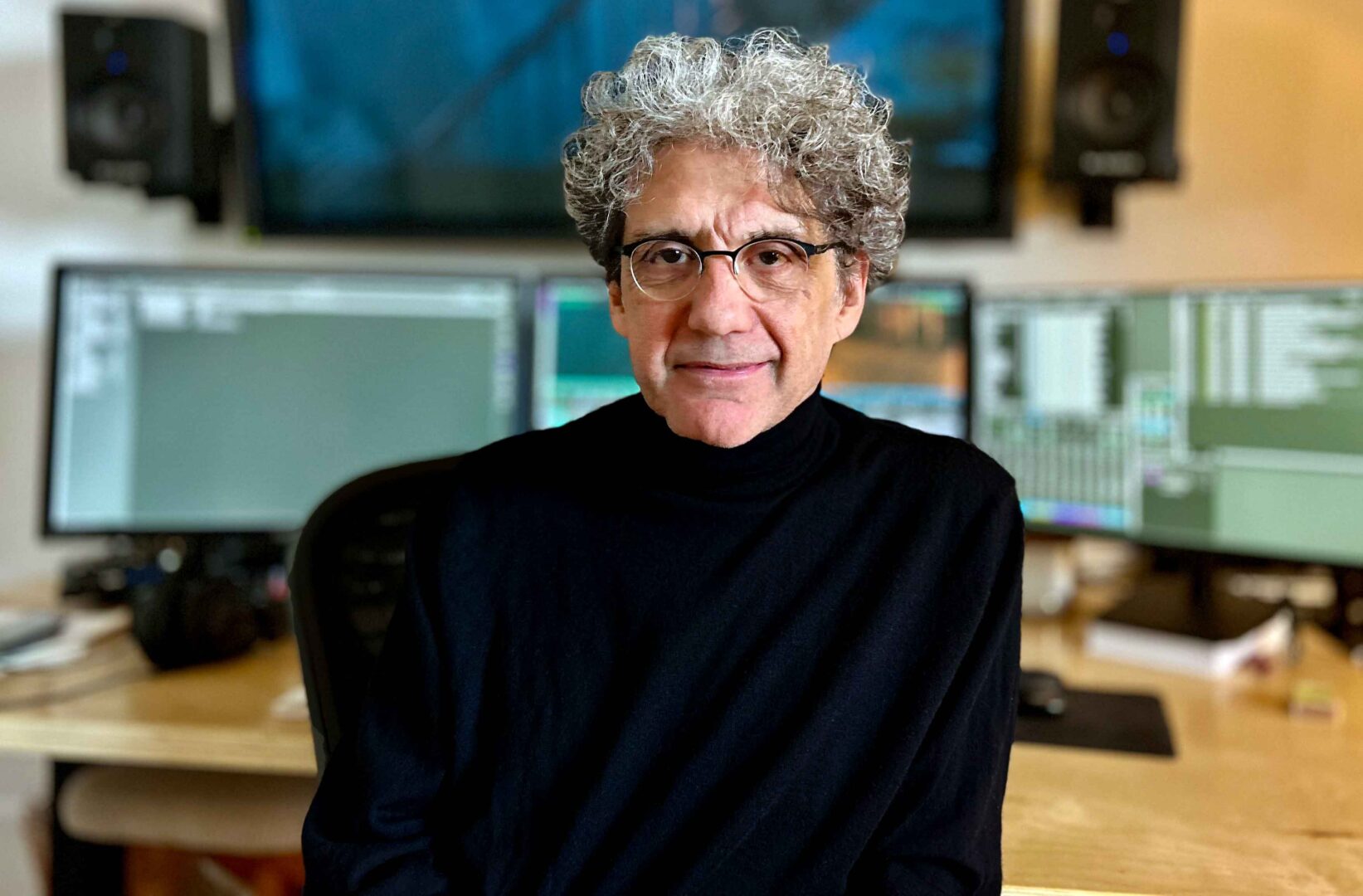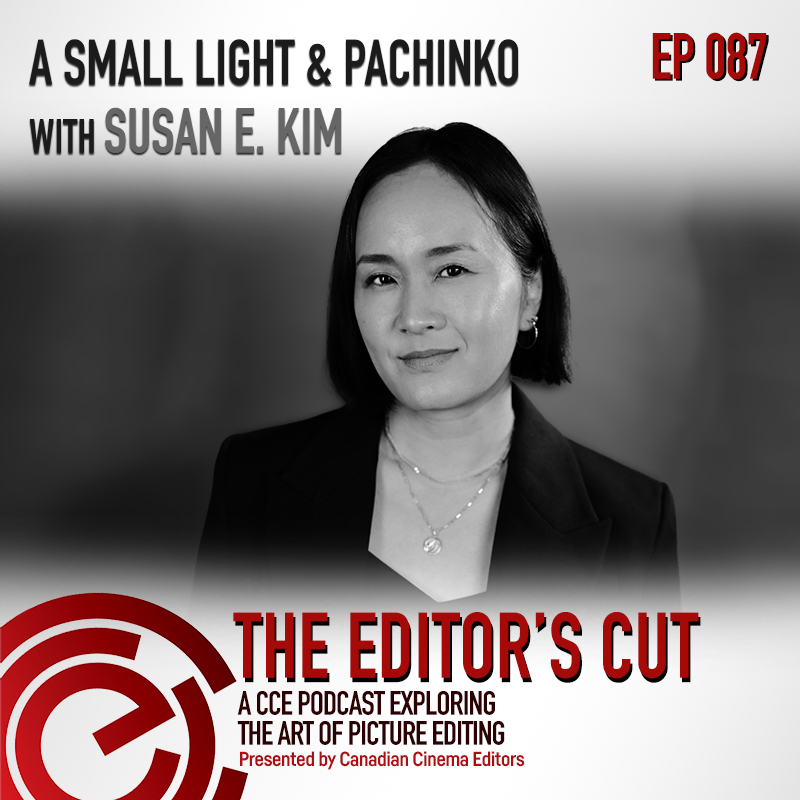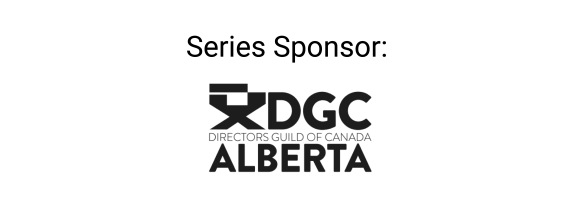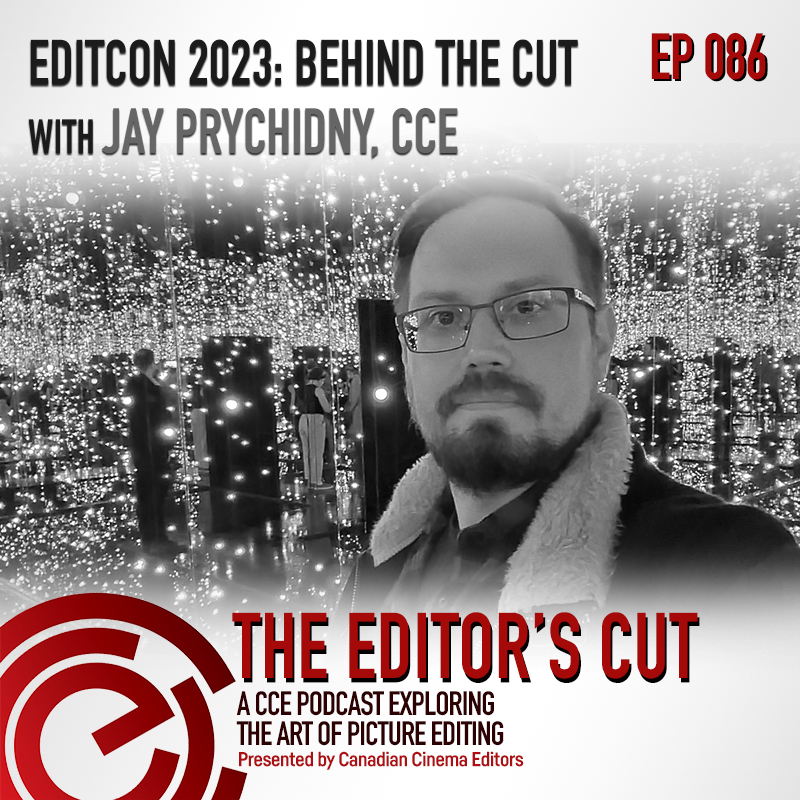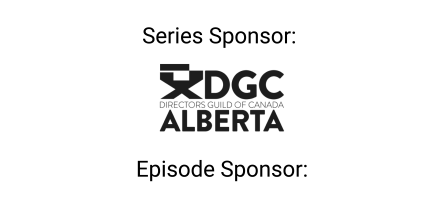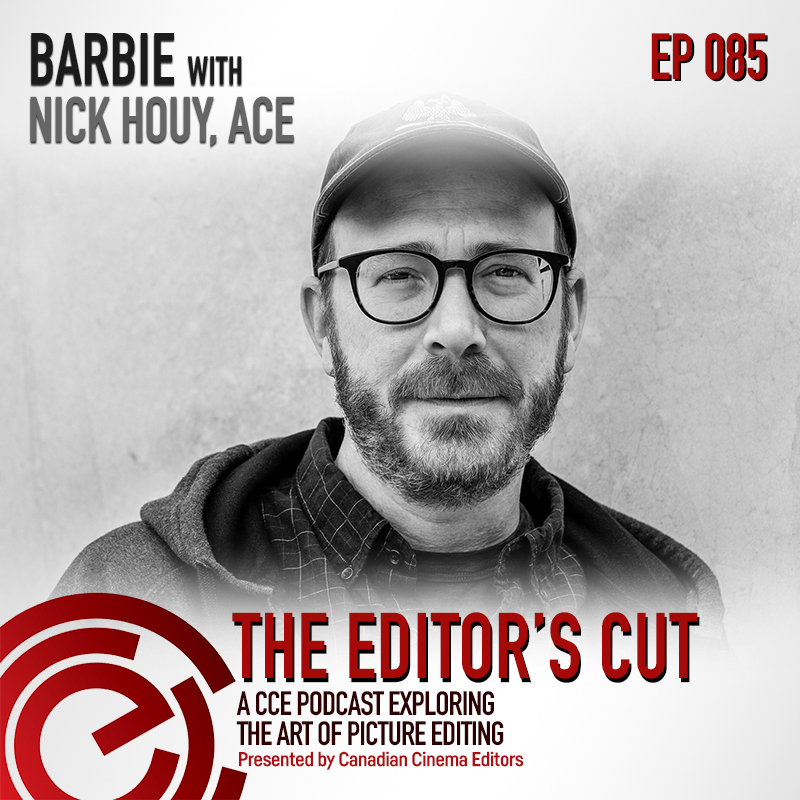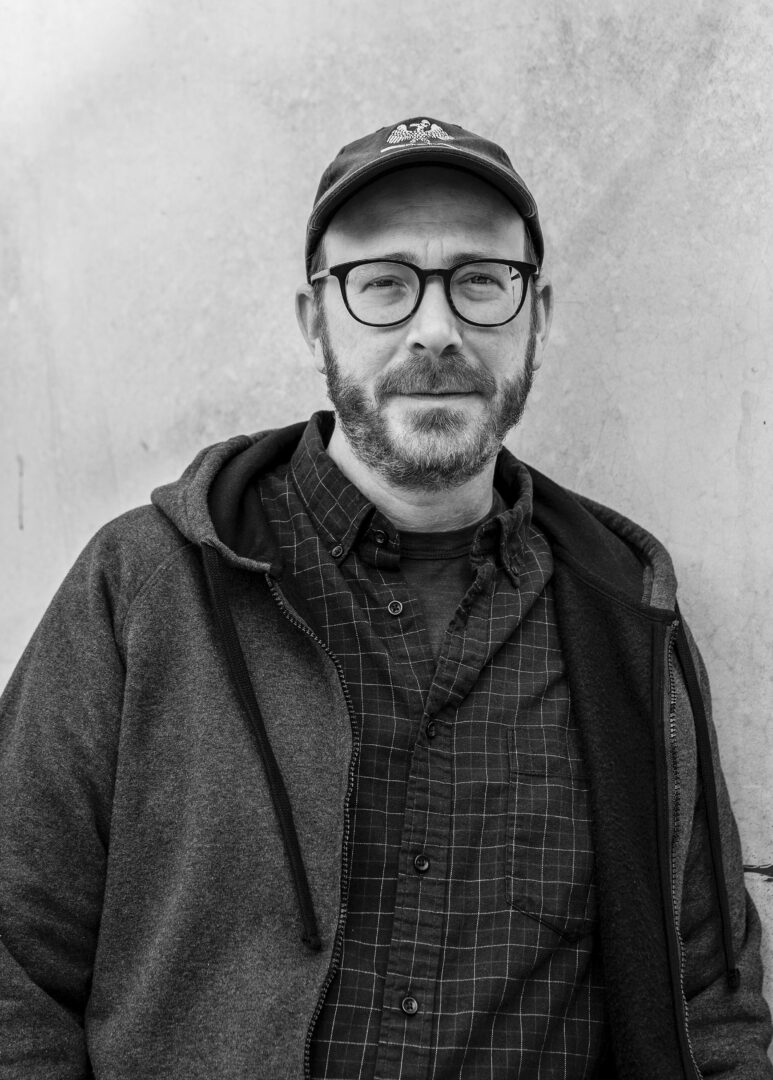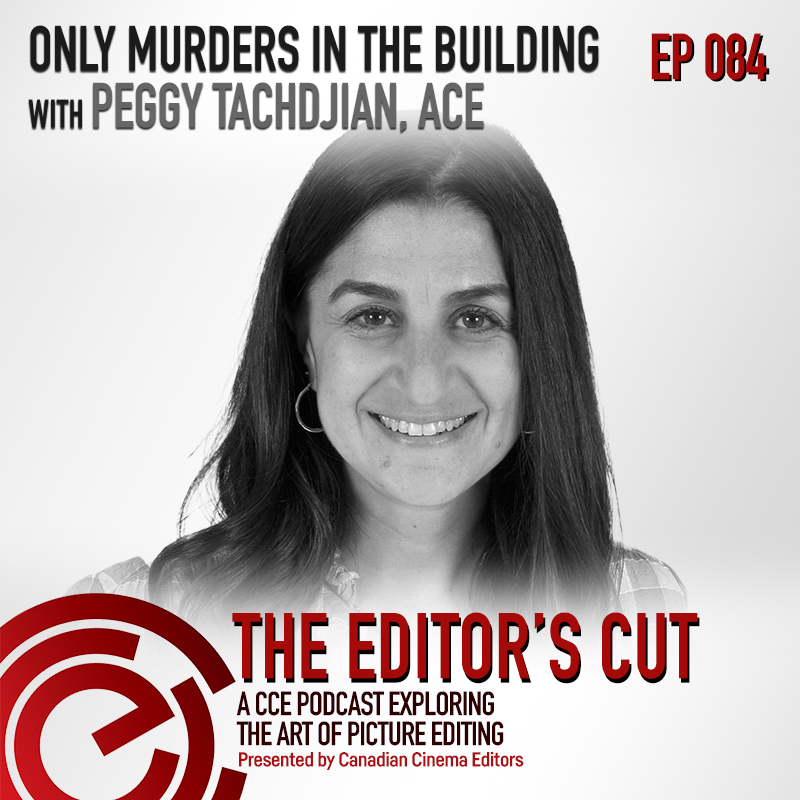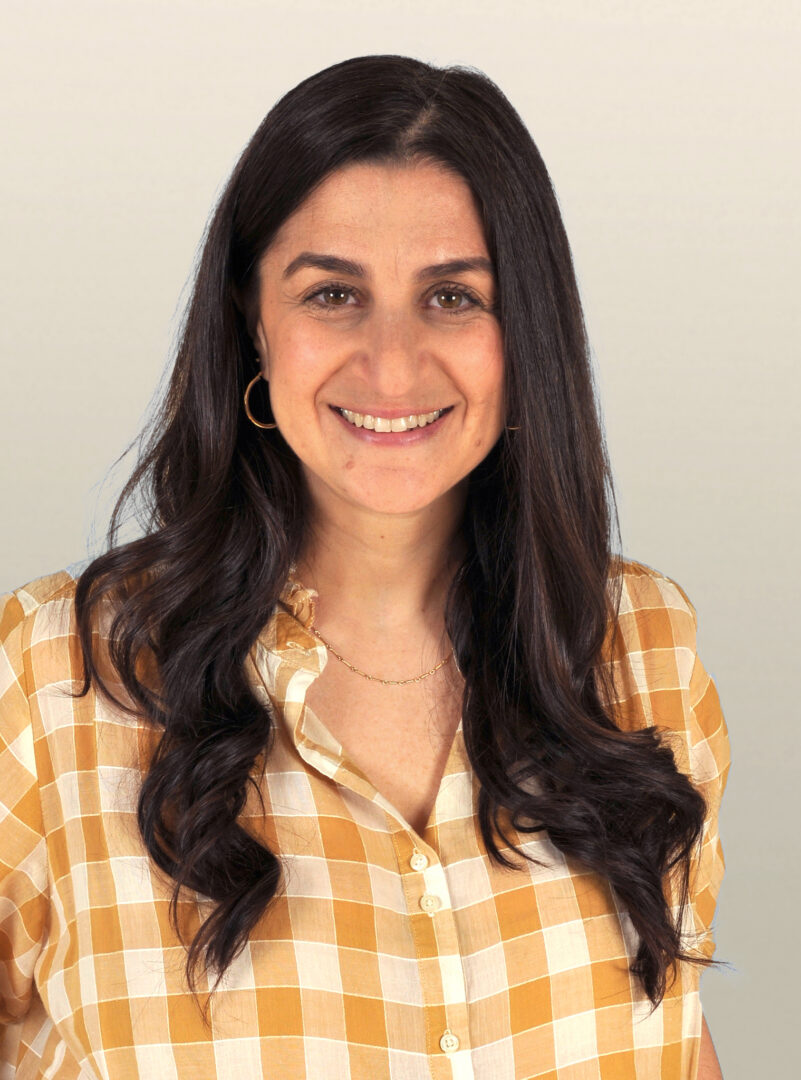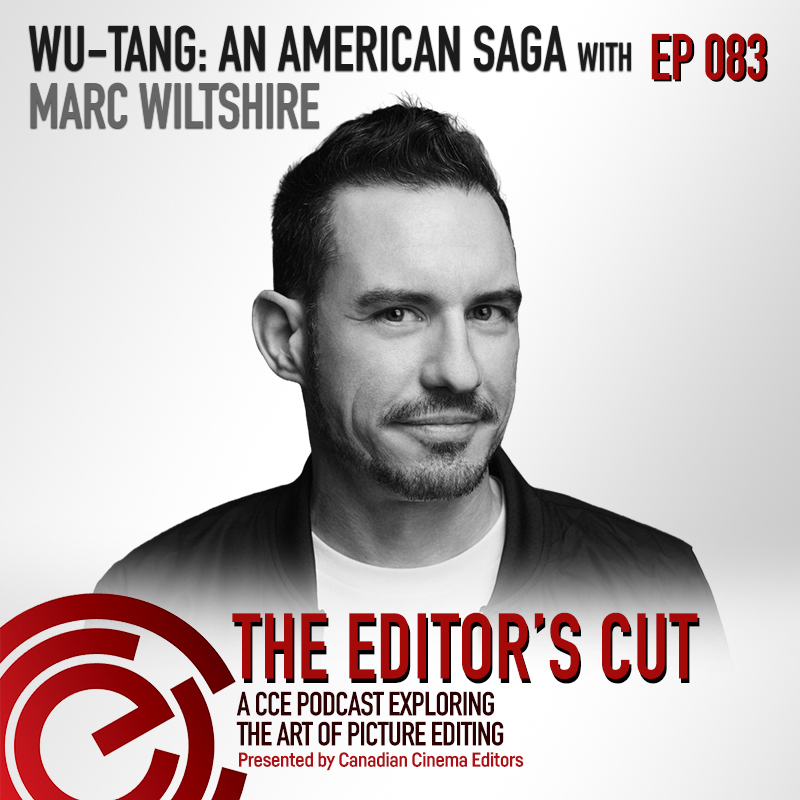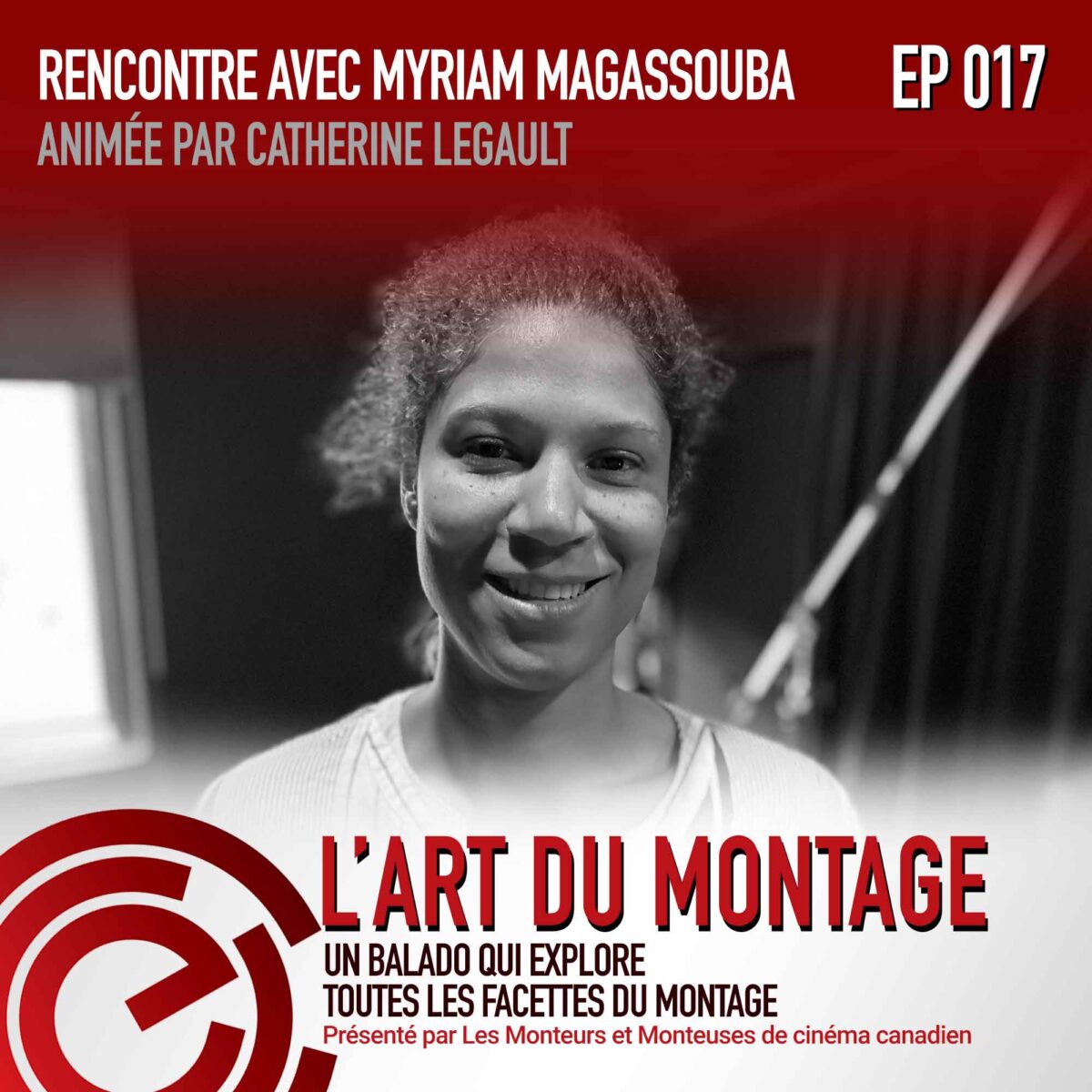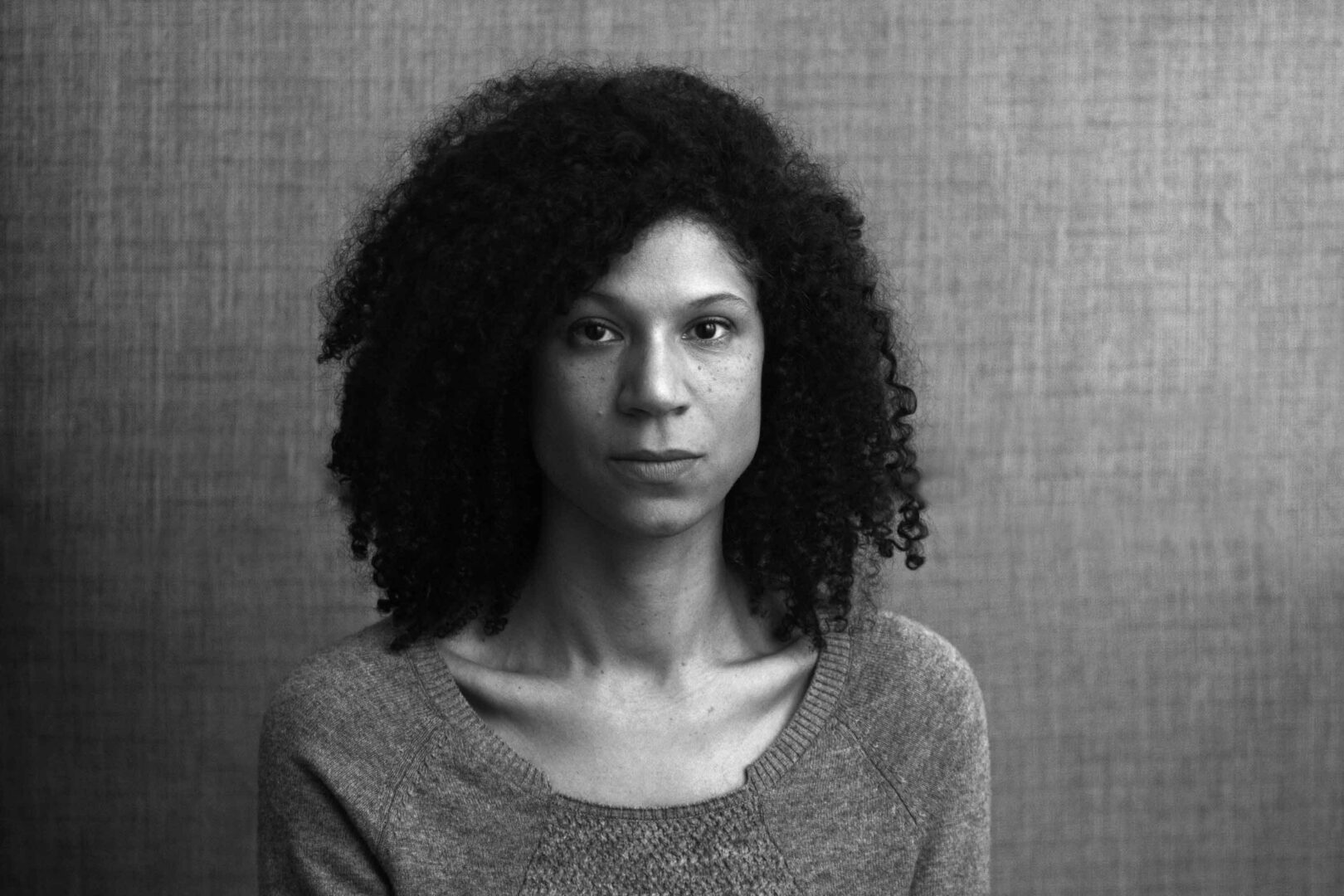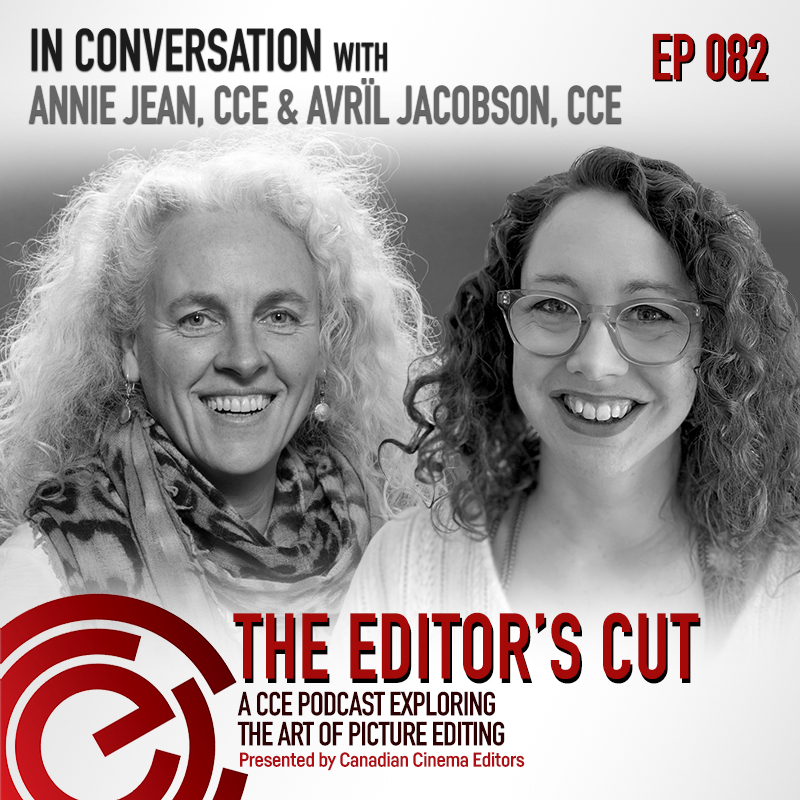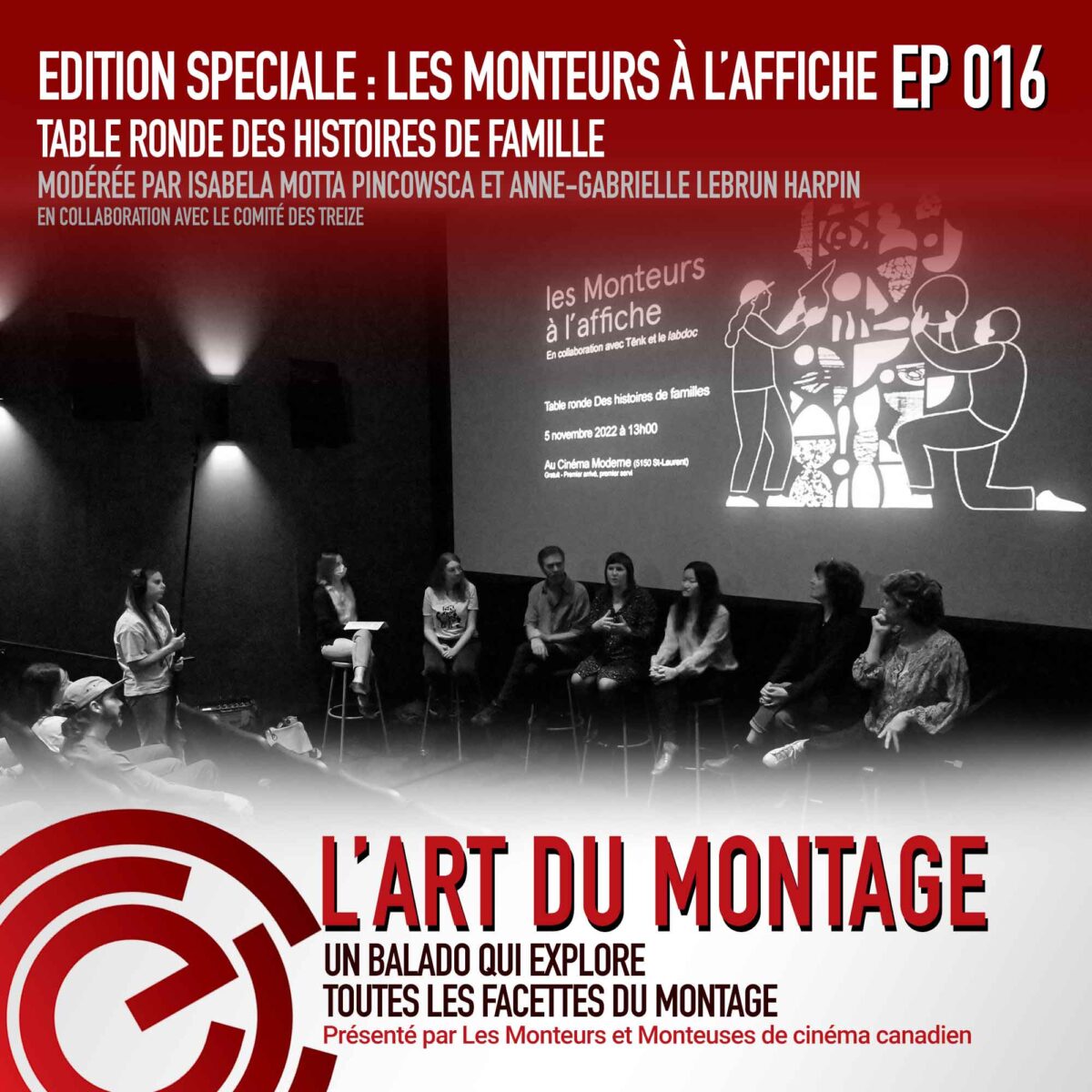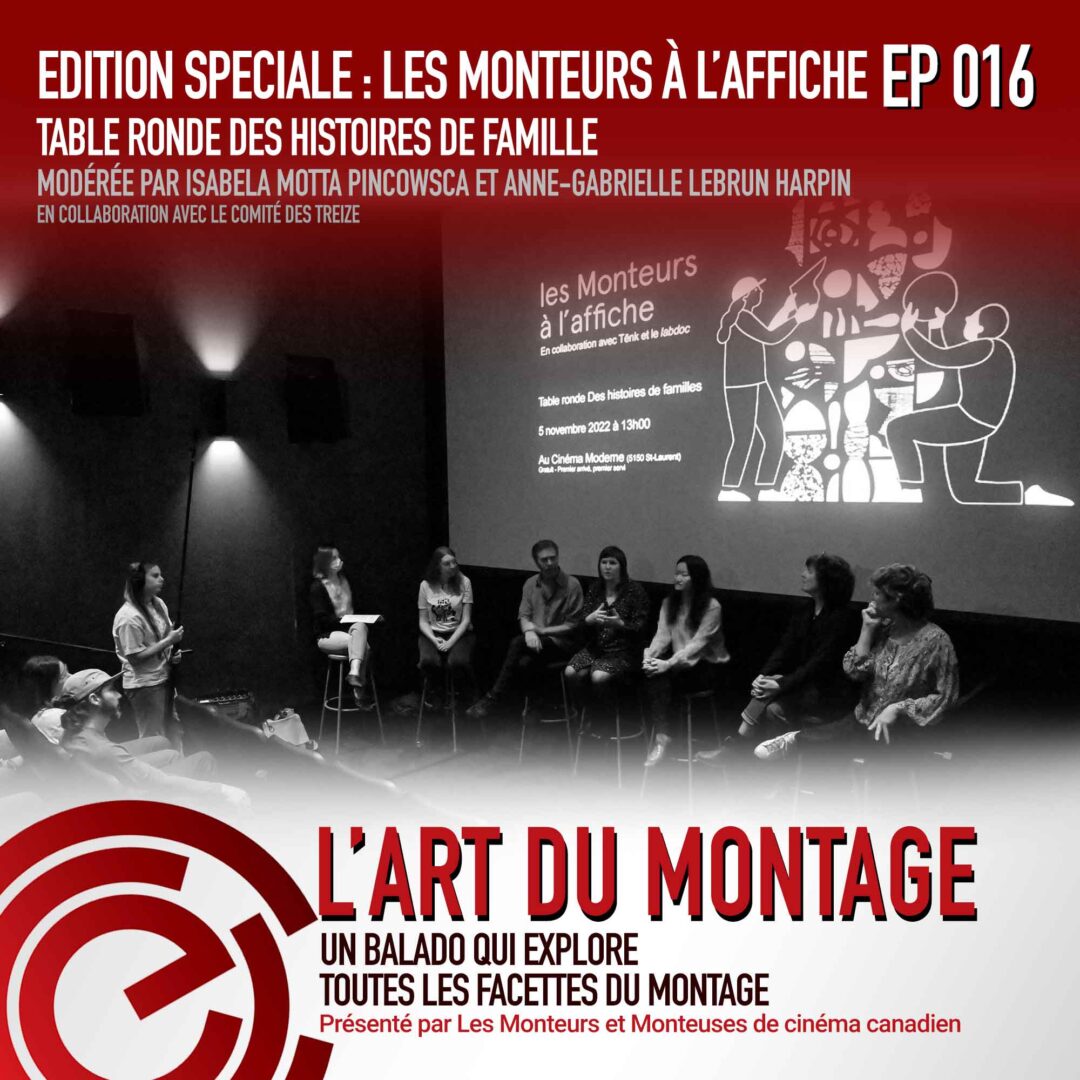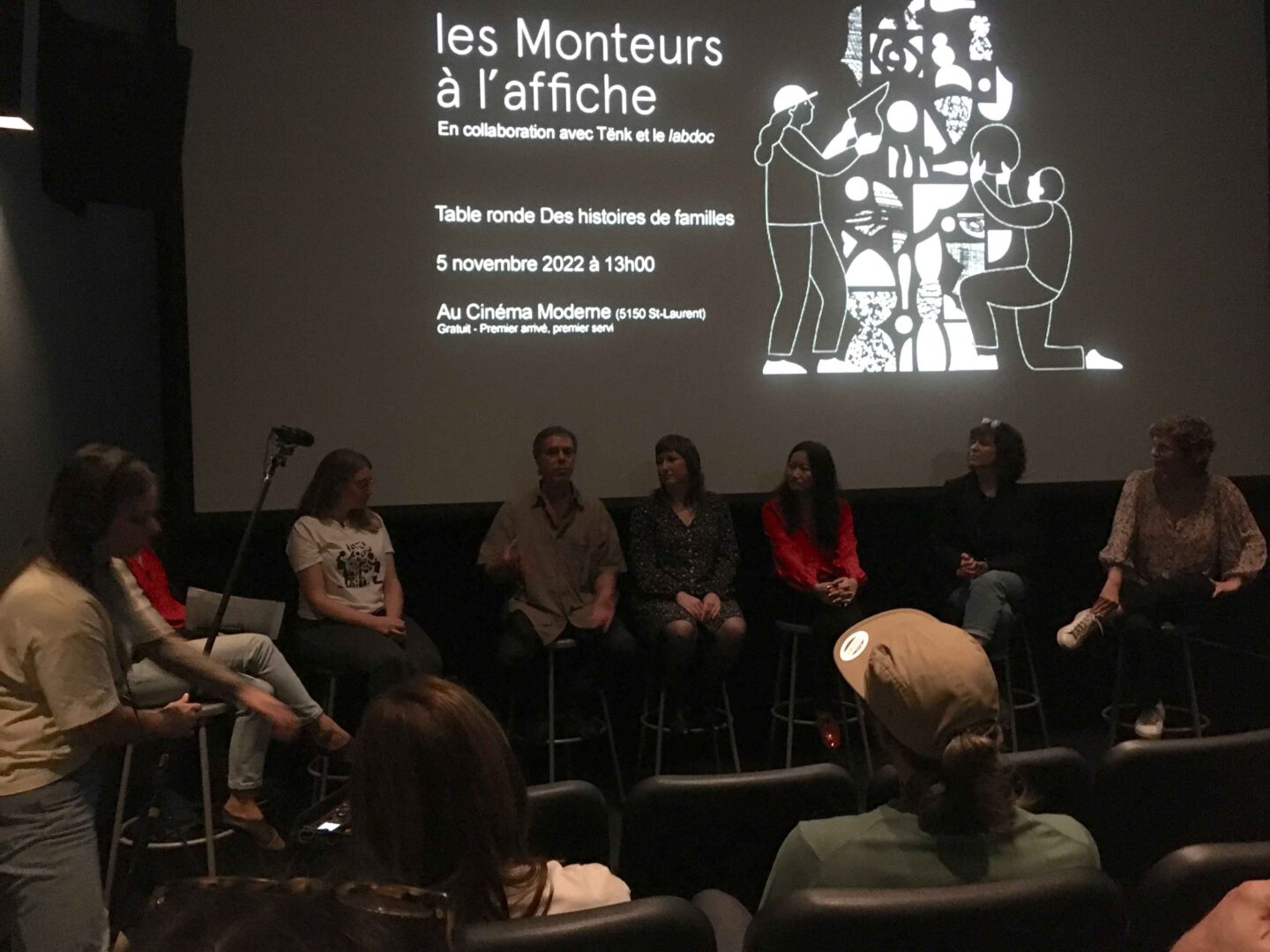The Editor’s Cut – Episode 081 – Joy Ride with Nena Erb, ACE
Nena Erb, ACE:
It is important to see yourself represented and to see women that are so like braved, they’re not afraid to be themselves. It was a good project for me. It kind of like gave me permission to speak my mind more. I have a tendency to like think something, and then, I count to 10. And by then, it’s like, who cares? So I don’t even say it, but now, I’m like, “No, I’m not gonna count to 10. I’m just going to say it.”
Sarah Taylor, CCE:
Oh, I love that. Yeah, we should all just say what we need to say. This is great. Hello and welcome to The Editor’s Cut. I’m your host, Sarah Taylor. We would like to point out that the lands on which we have created this podcast and that many of you may be listening to us from are part of ancestral territory. It is important for all of us to deeply acknowledge that we are on ancestral territory, that has long served as a place where Indigenous peoples have lived, met, and interacted. We honor, respect, and recognize these nations that have never relinquished their rights or sovereign authority over the lands and waters on which we stand today. We encourage you to reflect on the history of the land, the rich culture, the many contributions, and the concerns that impact Indigenous individuals and communities. Land acknowledgements are the start to a deeper action.
Today, I bring to you an interview with past guest, Nena Erb, ACE. We sit down and chat all things Joy Ride. If you haven’t had a chance to watch this film, please do check it out. It is hilarious and also very heartwarming. For those who don’t know Nena, in 2016, she received an Emmy Award for HBO’s documentary series, Project Greenlight. In addition, she has received three ACE Eddie nominations, two for her work on the HBO Comedy Series, Insecure, and the third for the CWS acclaim series, Crazy Ex-Girlfriend. Nena received her second Emmy award in 2021 for her work on season four of Insecure and a third Emmy nomination in 2022 for the final season. Nena’s parents no longer ask her if she should reconsider medical school. Without further ado, here is Nena.
Speaker 3:
And action.
Sarah Taylor, CCE:
This is The Editor’s Cut.
Speaker 4:
A CCE podcast.
Speaker 5:
Exploring.
Speaker 6:
Exploring.
Speaker 7:
Exploring the art.
Speaker 4:
Of picture editing.
Sarah Taylor, CCE:
Welcome back to The Editor’s Cut, Nena.
Nena Erb, ACE:
So good to be here. Thank you for having me again.
Sarah Taylor, CCE:
I’m so glad to chat more about what you’ve been up to over the last, I think we decided, three years like, Oh, it’s very exciting.
Nena Erb, ACE:
Yeah. Yeah, it’s been a while.
Sarah Taylor, CCE:
So just to catch the listeners up, for the people that maybe haven’t listened to your previous episode, can you just give us a bit of a Cole’s Notes on how you made your way to Hollywood?
Nena Erb, ACE:
I have an art degree. I did not go to film school. And afterwards, of course, what do you do with that, right? So my friend’s like, “Hey, come work with me in the art department.” And that’s kind of how I got into the business. You know… And I jumped around a lot, did a lot of different positions, until I finally found editing. And once I discovered what editing was, it just completely, the whole world just opened up. And I… yeah, was like I felt like I had come home in a way.
Sarah Taylor, CCE:
I feel that. So how long has it been now since you’ve started editing?
Nena Erb, ACE:
Oh my gosh. I was thinking about that. 20.
Sarah Taylor, CCE:
I’m with you. I’m 20 as well, so yeah. That’s awesome.
Nena Erb, ACE:
Yeah, I’m like, wow, time flew.
Sarah Taylor, CCE:
It really does, doesn’t it? When you’re doing something that you love, it just flies by. Yeah.
Nena Erb, ACE:
Yes.
Sarah Taylor, CCE:
So today, I wanted to talk to you about the wonderful film, Joy Ride, which it got me in stitches, and I cried. And there’s oh, it was so wonderful. You did a wonderful job. I want to know, how did you get involved with Joy Ride? And what were your first impressions when you were given the script?
Nena Erb, ACE:
I was on my last season of Insecure, and you know, as always, when you’re coming to an end of a project, you’re like, “Okay, let’s see what else is out there.” And my agents brought me several different projects, and I kind of was looking at all of them. And I said no to many, and Joy Ride was one that I said no to, not knowing anything about the script or anything about the filmmakers. It was just like, “Eh, no, it’s comedy. Move on.” Because I wanted to do drama, right? That was my goal. “Let’s do a drama. It’s been several years, so I need to do a drama.” And so, um and so the whole, you know, I just said no to a bunch of stuff. And after a while, they came back, and they’re like, “You know, I think the producers really want you to just read the script. No pressure. Just read it.” I was like, “All right. I am reading other scripts, so I’ll read this one too.”
And yeah, I remember I was on the Sony lot. I was reading the script and taking a little break and waiting for, I think I was waiting to go back for notes or something. And I’m reading it and I’m laughing, and of course, if you’re walking by, and you don’t know what’s happening, you must think, you know, I’m losing my mind. I’m just laughing, um, like loudly. And then, it came to the end, and I was sobbing and crying uncontrollably. And I’m sure, again, people were probably like, “Oh, that’s an overreaction from someone messing up your coffee or something.” But, yeah, it grabbed me. It just resonated so deeply with me for so many reasons.
And I ran back into my edit bay, and I was like, “All right, let’s take a… I need a meeting. I need to meet these people.” Because it was the dirtiest but funniest script I’ve ever read. And then, just the way it hits you at the end, I was not expecting that. And plus, I’m also very good at compartmentalizing, when I’m watching dailies, to really be objective. So I did not expect for that to grab me the way it did and to make me that emotional, so.
Sarah Taylor, CCE:
Amazing. From reading the script initially to the final film, were there any major changes that happened in the script?
Nena Erb, ACE:
Yeah. Yeah, there were. You know, my first cut was two and a half hours long. Because there’s ,you know, a lot of improv, and a lot of jokes, and jokes that led into other jokes. And so, I just wanted to put everything in there, so we can have a version where the words are on their feet, right? And so, that’s what I had. And then, after working with the director and the producers, you know, we very dramatically started cutting things out. And, and as expected, because no comedy would be two and a half hours long. So yeah, some of the change scenes that we lost were a scene between Lolo and Kat, scene between Lolo and Baron, you know, where he’s kind of letting her know that she’s, she has to be the calm one.
Like she’s usually the one that’s like very chaotic, and so, she needs to kind of find her inner peace and do something that makes her happy versus, you know, makes Audrey happy. And the other scene with Kat was when they’re both sharing their saki or soju and kind of realizing through their conversations that they’re more similar than not, right? And so, it was kind of like their bonding scene, the way that Deadeye and Audrey had their bonding scene were poker. So those were some of the scenes that we lost. But I had say the biggest difference is the slapping game, at the gay bar.
Sarah Taylor, CCE:
Yes.
Nena Erb, ACE:
It was much, much longer. It was like we had seen the two guys that started, they go through their game, and then, you know, Kat and Lolo come up and they’re eyeing each other. And the first time they do their toss out their numbers, I don’t even know what you call that, but yeah, so it was a tie. And so, they both had to slap each other. So they did that, and then they do it again, it was another tie, so they had to slap each other again, and then, again. And then, finally, Kat wins, and then, she just you know, kind of socks it to her, one really, really good punch.
And that was a version that was in the script. You know, we had tried that. We have that definitely. And then, we tried it with much more of their improv, because they, they really went at it. They went off the improv script. They did the improv jokes that the writers wrote, and then, they just kept going. And they were goading each other on. It was hilarious, but too long. And so you know, we’re trying to find what’s funniest and what feels the best pacing wise. And so, we’ve gone through a lot of different iterations of that scene. And um, finally, towards the end, I remember just thinking, “What if they just beat the crap out of each other? What if there’s no dialogue, no tie, they just get in there and then, they start hitting each other?” And they’re like, “Well, if you can make that happen.” And of course, after I say it, I’m like, “Oh, can I make that happen? Do I have what it takes? Haha in the material, in the dailies, to make this happen?”
Um and it was a challenge. I was kind of kicking myself, I’ll be honest, after you know, after I was trying it, because they never shot it where it was a ton of different hits to each other. So I had the ones that I had, and you know, there weren’t that many takes. It was a very complicated scene at the club. So yeah, I had a lack of options. I didn’t have a lot of options to work with, in terms of variations of them slapping each other. So a lot of it was cheated by either removing frames or adding frames and sound design to make it seem like it escalated to the final like punch. You know so yeah, so that was definitely very different, and I’m relieved that I was able to carry it off. And next time, I will think twice before offering a suggestion. Hahaha…
Sarah Taylor, CCE:
That’s a good tip for editors out there listening. But sometimes, we challenge ourselves in the best way, because it makes like a really great scene. And that scene was fantastic. It made me laugh so hard. You mentioned improv a few times in your last statement, so you got to work with so many hilarious actresses and actors. I could tell that there was gonna be, you dealt with a lot of improv. So how did you like you did your first cut, you put everything in, but how did you maybe decide, in the end, what jokes could stay? How did you, you know, maybe try to end a joke of their improv before? Cause you know they always just keep going, keep going. I’ve dealt with that too. So how did you handle the improv?
Nena Erb, ACE:
Oh, yeah. There were definitely a lot of improvs that just kept rolling. You know they build off the improv, off the improv, and then, they keep building. Um and you know, most of the time, I just go with my gut. It sounds simply oversimplified, but it’s really how… Yeah, it’s what I trust. I trust my gut. If it’s making me laugh, great. If I feel like it’s going on too long, I’ll just find a good place to cut. Point gray are geniuses. I mean they’re so, like well-versed in comedy. And the way that they shot this improv, I honestly you know, I’ve worked on a lot of comedies, they shoot improv all kinds of different ways, but they had it so planned out that all the improv was in their singles. And it was just genius. It was so smart, because you can make it work easily, you know, rather than if it’s on a two shot or slide and you know.
And every once in a while, there’s a you know over the shoulder, and that’s fine. I figured out ways to get around that for continuity. But… yeah, so they did it that way. They cross shot, so it’s not like, “Okay, we’re on one side. You do your improv line. Then we turn around for the reaction.” The reactions are in the moment, and it was just so, so great um. So they made it very easy to try different jokes. At the end of the day, I rank my jokes. If it made me laugh really hard, then it’s a five or a six. If it didn’t make me laugh that hard, it’s like a one or two. And then, sometimes, if it was like, didn’t even make the chart, I just put okay, hahaha, in the locator notes.
Sarah Taylor, CCE:
I love it. That’s great. Yeah.
Nena Erb, ACE:
So yeah, I had a way of tracking it. I had a way of making up a lot of different versions. So for each scene that had improvs, there was probably like, 10 more versions, each version with different improvs and different combinations of improvs.
Sarah Taylor, CCE:
So would you like then you’d cut the scene that was scripted, and then, you would do, say, 10 different versions of that same scene, so you could drop it into the cut if you needed to see? Is that kind of how you…
Nena Erb, ACE:
Kind of, kind of. Yeah, I would have the version that I like best, and then, I would kind of subclip you know the joke out, but a little padding on either side. And basically, what I would do then is like, okay, I would swap out another joke, and sometimes, you have to you know, change the going in and the entrance, and the exit to make it work, because people are suddenly in different positions, whatnot. Um so yeah, I had a lot of different versions of that. I realized, in the beginning, I was cutting and thinking like, “Oh my gosh, I’m moving so slow. I can’t believe I’m like, only getting through like X number of scenes.” Then I realized, “Wait a minute, I’ve actually cut like 45 minutes of content, because of all the different improvs, so I’m not actually moving that slow.”
Sarah Taylor, CCE:
Yeah that’s, that’s the most, I feel like that’s the most challenging part with comedy when you have actors that are hope that are good at improv. Um and yeah, I did a I did a feature recently, and our first cut was two and a half hours as well. And it was just like, “What jokes do we cut?” But on that note, I know that there’s a few jokes in this film I recently cut was called Hey, Victor and um, that still make me laugh today. So are there ones that just still hit you like they did when you first heard them?
Nena Erb, ACE:
Oh my gosh, there are so many different ones. I may have to think about this.
Sarah Taylor, CCE:
I sprung it on you.
Nena Erb, ACE:
Yeah. Oh my gosh. Yeah, we’ll have to come back.
Sarah Taylor, CCE:
Who was the team that worked with you with end post? Did you have some assistance? And what was your day-to-day process like?
Nena Erb, ACE:
Yeah. Yeah. I was fortunate and I had a whole team, first assistant, second assistant, and a PA. And I got really lucky. I found some really great people that really knew what they were doing, and it was a good team. It was a good team, and it was all female, which is great. And then, of course, if I needed like a male ADR, I would make sure they went around the building to see who was available and willing to do our temp ADR. And fortunately, we were at Pivotal Post and EPS, and there were other people around, so it was never a problem. But yeah, they were great. A lot of them were new to me, because I think the last time we talked, I was on Insecure, and my assistant, who received the Emmy along with me, she’s now editing. So I’m very, very excited for her, and so you know.
And so, obviously, I was like, “You go do your editing, I’ll find a different team.” and um so yeah so this was a whole new team to me. And learning everyone’s preferences and how they work was very fascinating. In the beginning, I would talk to them and see, “Okay, what are you really into?” And I found out that Tori, my first, was really into sound design.
Sarah Taylor, CCE:
Hmm great perfect
Nena Erb, ACE:
So I know, okay, the hard sound design, give it to her. I actually gave her all the sound design, and then, I found out that our second, Melissa Khan, was great at After Effects and TempVFX. So she got all that, and then, we had a little hiatus. I don’t know if you heard about that, but we had a hiatus and then came back for additional photography. And at that point, Melissa had already been got a job on another movie, so she couldn’t come back. So I had to find a new second. And we hired Joya Caruso. Fortunately, she was also good at VFX, so it was like, somehow, I came up with the perfect team.
Because editors care about sound design tremendously, but we don’t have the time to really dig into it. And I also try my best to have good TempVFX, but again, I can’t do a lot of it in the Avid. So it’s nice when I have an assistant that knows how to use After Effects or Photoshop or whatever other tools they have to make these temps happen. So yeah, so it was a good team. I got really lucky.
Sarah Taylor, CCE:
Sounds like a dream team. I love it. That’s great. You mentioned you took a break, and so, and so how much of like, were you I’m assuming you were cutting as they were filming, you took a break and came back and started cutting as they were filming again?
Nena Erb, ACE:
Yes.
Sarah Taylor, CCE:
How long after photography did you have to get to your like editor’s cut and stuff like that?
Nena Erb, ACE:
We started September 21st in 2021, and then, we took our hiatus like April 8th, I think it was that week. We had gotten the film to the second preview, and then, realized, “Okay, we need X, Y and Z to kind of you know to take the film into the direction that we want it to go in.” And so, the original idea was like, “Oh, I wish to do like a short six week break.” But then, of course, as you know, Ashley and Stephanie, Sherry, they’re all very, very busy. They’re busy actors. And Sabrina was touring, doing her standup.
So we had to, for schedule-wise, push it back a little bit, and then, we reconvened in November of 2022. And then, locked picture, I want to say like mid-January, mid-January, yeah. Yeah. Because we had another a third preview. And so, it was a lot, but additional photography, it was only for like, a handful of scenes. It wasn’t a lot. So I only got one day, after last day of dailies to get my editor’s cut together, because a lot of bulk of the film was not changed. So just the new material. So we had to get it together very quickly. And then, it was watching it down from the beginning to make sure that, “With the reshoots, are we repeating ourselves in the beginning? Or is something else not making sense now?” So it was a fascinating process.
Sarah Taylor, CCE:
So you did three previews. So from those previews, what kind of stuff did you take into consideration in the edit?
Nena Erb, ACE:
Most of it was always for clarity. I think a lot of the issues that we deal with, it doesn’t matter what movie, usually, what we learn from previews is that, you know, the filmmakers, myself included, might’ve been a little too close to material. And so, there are things that we may have lost, that need to go back in, you know, to kinda really flesh out the setup or for clarity purposes. And, and sometimes, you know, you notice, I’m sure you’ve experienced this as an editor yourself, you see like, the smallest little nuance in the performance, and you know the difference, but is that coming across as clearly to the audience, right?
Sarah Taylor, CCE:
Yeah.
Nena Erb, ACE:
Yeah, so that’s always a question that we end up answering a lot.
Sarah Taylor, CCE:
What would you say was the most challenging scene to cut?
Nena Erb, ACE:
All the set pieces, all of them. No, the one on the train with the drugs.
Sarah Taylor, CCE:
That was so good.
Nena Erb, ACE:
And the one with all the…our main four with the basketball players at the hotel, that big long, yeah, I don’t even know what you call that, the orgy? But that’s not really an orgy for everybody. So yeah, it’s not really the right word for it.
Sarah Taylor, CCE:
Yeah, they’re all individual moments, sexual moments. I don’t know what you’d call it.
Nena Erb, ACE:
So yeah, so those two were probably the hardest and not for any reason other than you have to make them funny. And for the drug scene, what I realized was, you know, my first cut, just following the script, not even adding any extras, it was too long. It was like two minutes, um and we had to cut down. And that was down to a minute, and it still just didn’t feel quite right. And then, finally, we’re like, “Why don’t we speed it up?” I was like, “Oh, that sounds kind of cheesy, but why don’t we all try.” So yeah, I added some speed ramps to the images, and that kind of made it funnier, in a very you know, childish kind of way, which I’m all for.
And and that was really helpful too, because as I’m cutting down, I’m realizing I’m making the shots shorter and shorter, and so, sometimes so short that you don’t really get the full action of what they’re doing. And so, that tends to kind of like make it a little more murky and unclear what’s happening. So using the speed ramps, you can see the full motion of you know, someone snorting coke or putting coke up someone else’s behind. So there were definitely funnier shots too that we had to lose, because it didn’t help tell the story. They were just funny little asides.
Once we had a decent cut, the challenge was finding music. We went through so many different songs. It got to a point where I think… Toko Nagata is our music supervisor. I was like, “Toko, you have to be patient with me. We’re going to go through a hundred songs with just this one thing, so so you know just bear with me.” And she was great about… She’s such a good sport, just always finding stuff. We tried classical, like Blue Danube, and then, we’ve tried instrumental, we try we had the composer, Nathan Michael David, compose some stuff to one of the earlier cuts. And it was like, “Well, that’s not quite the right vibe, because we’re looking for something super frantic, but funny.” And then, ideally, it’s not just a driving beat, it has to have accents for certain moments, when Sabrina’s putting something up Kat’s butt.
So … yeah, it was a lot of experimentation. And finally, Toko said, “Try this one. It’s a little quirky and a little off kilter, but maybe it’ll work.” It’s Burnt Rice by Shawn Wasabi. And it was perfect. It was completely off kilter, not what you expect to go with that scene. And yet, somehow it worked, and it had these great accents and stops and starts, that just like really helped elevate that piece for me.
Sarah Taylor, CCE:
Yeah, so when you finally found the song that fit, did you then go in and cut to those moments in the song? Or did you manipulate the song to work with what you had already cut?
Nena Erb, ACE:
I made the song to work with whatever we cut, yeah and that was always fun.
Sarah Taylor, CCE:
You’re like, “And I’ll move this here and I’ll move that here.” Yeah, that’s awesome.
Nena Erb, ACE:
Yeah, exactly. Yeah. And what was great was that we had a music editor too. We have two music editors, Jeff and Emily Kwong, and they were great. They’re such good sports. I would kick them stuff all the time and say, “Can you turn this around like ASAP?” And they would do it.
Sarah Taylor, CCE:
I’ve never worked with a music editor, so I’m curious, and maybe other people would want to know too, so would you do your like rough cut of the track to fit what you needed? So if maybe it would needed to be 30 seconds, and this one thing had to happen at the 15 second work, you do your rough cut of it and then, ship it to them, and then, they would make it musically sound amazing?
Nena Erb, ACE:
Yes and no. For my editor’s cut, they hadn’t come on yet, so I did all my temp. And then, once we started doing notes and if we wanted to switch out songs, you know because once you’re in notes, you don’t have time to stop down for music editing, because it’s very time consuming trying to make certain things fit where you want it to fit versus where musically it wants to be. So that’s usually when I would send them that scene and say, “Hey, we want to try these five different songs. Can you just make it work?”
And so, they would kind of like listen to the songs and pick the right parts, and that was what I loved about them. And I think a lot of music editors are the same way. They don’t think that music is just laying down a track. I think they all listen to the whole thing and pick the right parts of the lyrics, pick the right parts of you know the chorus, the verse, and kind of put it together in their own little recipe, very similar to the way an editor would. So I just really appreciated how they work, because that’s what they did.
Sarah Taylor, CCE:
Yeah, that sounds amazing. I might have to get myself a music editor on my next show. Anyway, what was the most enjoyable scene to cut?
Nena Erb, ACE:
Honestly, I enjoy the entire thing, but I think there’s one scene that was super, super special to me. And it’s a very simple scene, just um Audrey getting dressed the next morning, Lolo’s putting on her you know makeup and earrings and whatnot. They’re getting ready to go to the adoption agency. So it’s just a conversation, simple, innocuous conversation between the two of them, where Audrey kind of like bears her soul and talks about what it was like to be adopted. And she kind of wonders if her life would’ve been different had she not been.
And…and it really resonated with me, because my mom was adopted. And so, I remember having a lot of different conversations with her about like you know you know, “Do you know why you were given up?” And she was always wondering herself, too. And what that means, what being adopted means. You’re the outsider kind of in your family, that basically chose you. So it’s a whole, it’s a lot to unpack, right? Yeah. So the whole thing, belonging, identity, all of that, that was stuff that I talked to my mom about quite extensively. So when I saw that scene, I was like, “Oh, I’m going to really enjoy cutting this.” And I did.
Sarah Taylor, CCE:
And I think that’s why Joy Ride also resonates with a lot of people out there. There’s not a lot of stories representing this … this idea of growing up in America and then going to “where you’re from,” and that whole thing. And then, yeah, discovering this whole other side of you that… And we don’t get to see people unpack that on screen, and I think that’s… it’s so important. Yeah, I think Joy Ride did a good job at that.
Nena Erb, ACE:
Oh, thank you. Thank you. Yeah. At South by Southwest, I expected people to laugh, and kind of sniffle at the emotional parts. What I didn’t expect was, during the Q&A, many adoptees came up and they just were very emotional about the whole thing, seeing their story unfold the way that it did. And and it was so touching you know. One of the adoptees, what she was talking about was so heartfelt that she came up to the stage, and Ashley part gave her a hug. And they had exchanged some words. No one knows what was said, but it was just such a sweet moment. I think everybody was crying.
Sarah Taylor, CCE:
This is, and those are the moments where you’re like, “This is why we make 10 versions of a scene. This is why we do what we do, right?”
Nena Erb, ACE:
Exactly.
Sarah Taylor, CCE:
Oh, that’s really great to hear that you got to see that feedback in real like in action and oh, that’s beautiful. Love it. I love it.
Nena Erb, ACE:
Made it all worth it.
Sarah Taylor, CCE:
Totally. Yeah. You have done a lot of TV, from what I have seen and what we talked about before. So was this one of your first major films? Or had you done like feature film work before?
Nena Erb, ACE:
Yeah, but they’re mostly um smaller independents. This was probably my first studio feature. So there are different things to learn about the studio system versus independence, where you’re just kind of making it up as you go along in the studio to give notes.
Sarah Taylor, CCE:
Yes. So what was the biggest change in your workflow that you had to do, maybe coming from the TV world to the feature world?
Nena Erb, ACE:
It’s very interesting. it’s um you know I think, from the outside looking in, you would think that features have all the time in the world, right. I think, um in television, if you’re doing a half hour, you have two days after last day of dailies. If you’re doing a one hour, you have four days, ideally three to four days after last day of dailies, to get your editor’s cut together. Um well, as you know, my first cut was two and a half hours, and I only had four days after last day of dailies to get that together, to really polish the entire everything and score the entire thing. So yeah, in that sense, I had less time than I would if I was on a TV show um, but in the grand scheme of things, you have more time after that to experiment, because you have 10 weeks with a director. On TV, you have two to four days, if you’re lucky, you know um, and then, you have maybe two weeks with a producer who’s a showrunner on TV shows.
And um this time, it was like, I think the producers came in around week six. Or no, they came in pretty early. They came in at week five of director’s cut, because our director just felt like she was ready to show it. And so, yeah, they came in, and so, they had quite a bit of time um, normally, I’m not really sure if there’s a standard, in terms of like how many weeks producers get, but yeah, they came in at week five during a director’s cut. And then, just kind of, from there to the end, they were very, very involved and a part of the collaborative process, so they had a lot of time versus TV.
Sarah Taylor, CCE:
Totally. So you still have to go quick at the beginning, and then, you get to have time to really massage your notes and go do all that stuff after the fact.
Nena Erb, ACE:
Yeah, and you get a lot of time to experiment like, “What would happen if we just take out this complete storyline? you know Yeah, what would happen if we lost this entire scene?” you know And then, previews would be the biggest difference between the two. Films, you preview. In TV, you don’t really do that.
Sarah Taylor, CCE:
No, no. You mentioned that you came to Canada to do the sound mix, and so, how has that experience like? Often in TV, do you have the time in TV to go and actually do a sound mix? Is that usually afforded?
Nena Erb, ACE:
Yes.
Sarah Taylor, CCE:
Okay. So what was the difference coming to Canada to be part of… Well, not that it matters that it’s Canada, but I like that it’s Canada. What was your time like?
Nena Erb, ACE:
Oh, I love that it was in Vancouver. It’s the first time I’ve ever been there, and um you know the city is great. There’s so much good food. And then, the weather was pretty, it was cold, but it wasn’t wasn’t like blizzard cold. We only had a snowstorm for a few days that I was there. It was very easy to get around. People were so nice. It was bizarre. It was like, coming from LA, you’re just used to people honking and driving crazy on the road. And over there, I think I was there with Tori, my first, and after the first few days, I looked at her, we’re at dinner, I’m like, “Am I imagining this or no one honks here? Have you heard of anyone honk?” And she’s like, “No, I haven’t.” I was like, “Okay, okay, so no one’s honking.” So I think, at the last week we were there, I heard one person honk.
I was very excited. But that’s just my observation of Vancouver. But the sound mix itself, I usually try to make time for it on TV shows, but oftentimes, you’re doing dailies, so then, that just means your days are longer, if you want to go do your sound mix. For Joy Ride, it was such a luxury to have three weeks to work on your mix. you know and you’re there for ADR, you’re there for a large amount of time, and it’s nice. It’s nice to be able to have that time and not feel rushed like, and feel like you may miss something afterwards. Because if you did, that’s okay. We’ll be back next week to do it again.
Sarah Taylor, CCE:
Wow, that’s such a novel experience for me. I don’t know if it’s just a Canada thing or an Alberta thing, but I’ve been to only one sound mix in my whole career. And it was amazing. And I was like, “This is great.” And I was like, “I should do this all of the time,” but it’s just never afforded in the schedule. And so, unless I decide to just go on my own, which I could, but then, I’m always on something else. But yeah, for the people that haven’t experienced that, what is it like? You like sit there and you suggest sound effects, kind of, if you don’t mind, just a little process of what it’s like to be on the sound stage.
Nena Erb, ACE:
Um you know Some editors wanna be there, when they’re building it all together, but I like to just give them time to do their thing. And I’ll come back and give notes, ideally, before the director and before the producers. For TV, I definitely get in there for at least a day before the producers are there for playback, just because I’m looking for things that they may not be concerned about you know. And same thing for the movies. You go there, you watch. For features, because they work in reels, they’ll say, “Okay, we’re going to work on reel one today, day one, reel one.” So they’ll play it. You watch it, you kind of make notes and either time code or like film and feet, you know frames and feet and stuff, um and yeah, you just kind of listen for things. Is the entire line of dialogue clear? Is the sound effect right? Is it too loud? Is it not loud enough? You know how does music sound in combination with all of it you know?
Yeah, it’s a lot of that. And sometimes, you’ll have a great sound effect, but then like, in certain places, it sounds like a production mistake right. And so, you’ll catch those moments. It’s like, “Okay, so at this frame here, can you just lift out that little whatever it might be? Because it sounds like someone dropped a hammer versus what it’s supposed to sound like.” So yeah, it is really, really interesting how things like that come across. And so, I love the process.
Sarah Taylor, CCE:
Now, I’m going to have to see what project I can sneak in on, because yeah, I think there’s times where I’ll listen to the audio after and be like, “Oh, man.” I remember going to a screening of one show I did. It was a big launch, episode one played, and I was like, “Ah, the music’s too loud.” So yeah, maybe I should be allowed to do it. Yeah, I’m gonna, I’m gonna to advocate for myself to go to the sound mix. That’s what’s going to happen.
Nena Erb, ACE:
Yes, yes. No, I highly recommend it, because yeah, there’s nothing worse yeah, than watching something that’s already done and you’re just cringing, because the music is too loud or not loud enough. you know Yeah, or the ADR sounds like ADR, right?
Sarah Taylor, CCE:
Yeah. Yeah, exactly. Yeah.
Nena Erb, ACE:
That’s one thing I look for a lot in the mix. It’s like, “Hey, can we make sure that blends a little bit better? Can we dirty that up, so it’s all sounds the same?” Because ADR has a tendency to sound very clean.
Sarah Taylor, CCE :
Yes, for sure. Yeah. Okay. Well, I’m going to take those tips into my next thing. Was there anything from this film that you learned that you’re taking onto your next projects?
Nena Erb, ACE:
Yes. I have definitely learned a better way to organize myself when I have a lot of different options and all you know of a scene, because naturally, I do like different versions to myself, even without improvisation. But I think I hadn’t figured out a really efficient way to manage that until now. And honestly, I’m sure it’ll probably progress and evolve and change as things go on. But having to do that on a feature is, is like it’s it’s a lot, you know cause every scene, there’s something. And so, you have like 120 scenes, and it within that, are all these different versions. So so yeah, so I had to be really organized and quick about it, because when you’re working with them, they’re in the room. You wanna quickly be able to access that version and then, make changes and still keep it all organized.
Sarah Taylor, CCE:
A hundred percent. Yeah. like okay. Take it from this bin and adding it to this. Yeah. Oh, I can see how that could get very complicated and wrong sequences could be dropped in. So yeah, organization is such a huge thing in the editing world and how like I find it’s constantly evolving for me as well. And having an assistant who’s really good at organizing is like so, so lovely. I love them when they’re organized. Yes. So anyway, shout out to my assistant, Blair, who does the best organization ever. Yay, Blair. So what what’s coming up next for you? Or what are you working on now? And what can people go watch?
Nena Erb, ACE:
Um I’m on a Marvel project right now. Um yeah, unfortunately, I can’t say too much about it.
Sarah Taylor, CCE:
That’s okay.
Nena Erb, ACE:
Or like the Navy SEALs’ gonna crash through my ceiling and take me away.
Sarah Taylor, CCE:
Yeah like something really very dramatic will happen.
Nena Erb, ACE:
Right. But hopefully, you know it’ll be ready to come out sometime in 2024, provided that hopefully the strike ends soon, we can all go back to work.
Sarah Taylor, CCE:
Yeah. So what’s been happening for you right now with the strike?
Nena Erb, ACE:
I’m not working right now. I’m just enjoying a little time off. Yeah. I was very fortunate to be working up until the end of July. So yeah, time off for me is a welcome thing right now, so but I know that it’s been really hard for a lot of people in this industry. So as terrible as it is, I mean we all know that it’s difficult, but it’s the right thing to do to strike.
Sarah Taylor, CCE:
Hopefully it doesn’t last too much longer, and we can get back to creating really funny, hilarious movies like Joy Ride that also impact people and have themselves being seen on screen, which is so important. So um yes. So thank you for all of the amazing work you’ve done on Joy Ride. Anybody out there, please go watch this film. You can rent it now online. I’m sure there’s other places you can stream it from, but oh my gosh, it’s so funny. So go check it out. Is there any last nuggets that you want to share with us today, Nena? Oh, we got to circle back to your funniest joke. Circle back to the joke.
Nena Erb, ACE:
Funniest joke? I think it’s the, “You’re thinking about a penis.”
Sarah Taylor, CCE:
Hahaha, yes.
Nena Erb, ACE:
Or the chubby bunny thing.
Sarah Taylor, CCE:
Yes. Oh, okay. Very good.
Nena Erb, ACE:
Yes, yeah. And the most obscure jokes are, there’s so many that are very culturally specific. But yeah but yeah, the chubby bunny one is definitely one that gets me every time still.
Sarah Taylor, CCE:
Oh, I love it. Can I ask you, what was it like for you, as an Asian American, getting to work on this film that was pretty much a full cast of Asian people?
Nena Erb, ACE:
It was weird, I’ll be very honest with you. I don’t think I’ve done many projects for like where I see Asians everywhere. It’s all over my dailies. It’s like, “What?” Usually, it’s like you have one or two. You know um, And so, it was refreshing. It was… It was great. It was really, really great. Um and I hope that happens more, because you know I think, for not just Asians, but for everybody, cause it’s important to see yourself represented and to see women that are so like braved to do whatever you know to say things, they’re not afraid to be themselves and it was just a really, it was a good project for me. It kind of like gave me permission to speak my mind more. Um I have a tendency to like think something, and then, I count to 10. And by then, it’s like, who cares? So I don’t even say it, but now, I’m like, “No, I’m not gonna count to 10. I’m just going to say it.”
Sarah Taylor, CCE:
Oh, I love that. That’s amazing. Yeah. We should all just say what we need to say. This is great. Oh, that’s wonderful. Well, thank you for sharing your journey on Joy Ride. It was quite fun. And I hope that we can maybe connect and talk about your next project when it’s all out and ready to go.
Nena Erb, ACE:
Oh, absolutely. Yeah. I love talking to you. You’re amazing.
Sarah Taylor, CCE:
Great. Thank you so much. Okay. Have a good one.
Nena Erb, ACE:
Thanks.
Sarah Taylor, CCE:
Thanks. Bye. Thanks so much for joining us today. And a big thanks goes to Nena, for taking the time to sit with me. Special thanks goes to Alison Dower and Kim McTaggart at CCE. The main title sound design was created by Jane Tattersall, additional ADR recording by Andrea Rush. Original music created by Chad Blain and Soundstripe. This episode was mixed and mastered by Tony Bao.
The CCE is proud to support CREATIVES EMPOWERED. CREATIVES EMPOWERED is a nonprofit collective of artists and creatives. They are Black, Indigenous, and people of color empowering each other as an allied community. They are film and TV, media and arts professionals from emerging to established based in Western Canada. They’re the first and only organization of its kind in Alberta. CREATIVES EMPOWERED is inspired by and embodies what is truly possible when racialized talent are empowered to thrive.
Speaker 8:
The CCE is a nonprofit organization with the goal of bettering the art and science of picture editing. If you wish to become a CCE member, please visit our website, www.cceditors.ca. Join our great community of Canadian editors for more related info.
